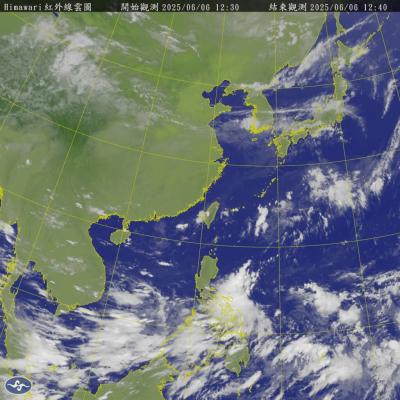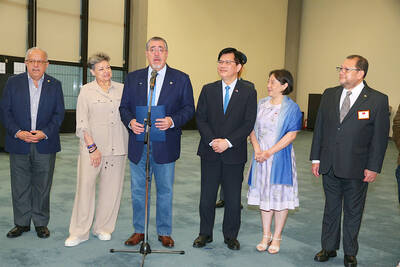Expressing concern over a recent "dramatic shift" in the cross-strait military balance in favor of China, the US Senate has unanimously approved a measure urging the Bush administration to pressure Europe to maintain its arms embargo on China and "discourage" foreign companies from selling sensitive military items to Beijing.
The measure, adopted quietly this past week, is part of a proposal that calls on Bush to establish an overall plan to counter China's economic and military rise in East Asia in view of recent economic conflicts between Beijing and Washington, and China's break-neck military buildup.
The measure seeks to implement a number of proposals presented earlier this month by the US-China Economic and Security Review Commission, a blue-ribbon congressionally established panel, that expressed concern over China's newfound economic and military power in East Asia, and faulted the administration for failing to develop a comprehensive national security plan to deal with a rising China.
Among other things, the commission's report called for closer military and political ties between Washington and Taipei, including the exchange of high-level visits, and criticized the pan-blue forces in the Legislative Yuan for blocking the major arms sales package the Bush administration offered in 2001.
The Senate approved the measure on Tuesday as an amendment to a bill that authorizes defense department programs for the fiscal year 2006, which begins Oct. 1.
The approval came just two days before the European Parliament adopted a resolution urging the EU to retain the arms embargo, saying the reason for its existence -- Beijing's abysmal human rights record and the 1989 Tiananmen Massacre -- has not changed.
The US Senate vote, however, does not assure that the proposal will become law. As worded, it is non-binding, expressing only the "sense of Congress."
It is not included in a parallel defense authorization bill that was approved earlier by the House of Representatives.
The two versions will now go to a joint conference committee, where it could be jettisoned by the House conferees. However, in the past, it has been the House that has been willing to approve such provisions, with the Senate rejecting them, which should improve the chances of the measure winning final congressional approval.
The bill urges "actions by the president and secretaries of state and defense to press strongly their European Union counterparts to maintain the EU arms embargo on China."
It also urges the administration to act "to discourage foreign defense contractors from selling sensitive military use technology or weapons systems to China."
It also calls for an annual administration report to Congress on the nature and scope of foreign military sales to China, particularly by Russia and Israel.
"China is developing a leading-edge military with the objective of intimidating Taiwan and deterring United States involvement in the Strait, and China's qualitative and quantitative military advancements have already resulted in a dramatic shift in the cross-strait military balance toward China," the bill says.
It also cites the approval by China's National People's Congress of the "Anti-Secession" Law in March.
The law codifies the legality of the use of military force if Beijing feels that Taipei is going too far toward independence. Passage of the law by Beijing was seen as one of the main reasons that the EU dropped plans last summer to lift the embargo.

Greenpeace yesterday said that it is to appeal a decision last month by the Taipei High Administrative Court to dismiss its 2021 lawsuit against the Ministry of Economic Affairs over “loose” regulations governing major corporate electricity consumers. The climate-related lawsuit — the first of its kind in Taiwan — sought to require the government to enforce higher green energy thresholds on major corporations to reduce emissions in light of climate change and an uptick in extreme weather. The suit, filed by Greenpeace East Asia, the Environmental Jurists Association and four individual plaintiffs, was dismissed on May 8 following four years of litigation. The

STAY AWAY: An official said people should avoid disturbing snakes, as most do not actively attack humans, but would react defensively if threatened Taitung County authorities yesterday urged the public to stay vigilant and avoid disturbing snakes in the wild, following five reported snakebite cases in the county so far this year. Taitung County Fire Department secretary Lin Chien-cheng (林建誠) said two of the cases were in Donghe Township (東河) and involved the Taiwan habus, one person was bit by a Chinese pit viper near the South Link Railway and the remaining two were caused by unidentified snakes. He advised residents near fields to be cautious of snakes hiding in shady indoor areas, especially when entering or leaving their homes at night. In case of a

A tropical disturbance off the southeastern coast of the Philippines might become the first typhoon of the western Pacific typhoon season, the Central Weather Administration (CWA) said. The system lacks a visible center and how it would develop is only likely to become clear on Sunday or Monday, the CWA said, adding that it was not yet possible to forecast the potential typhoon's effect on Taiwan. The American Meteorological Society defines a tropical disturbance as a system made up of showers and thunderstorms that lasts for at least 24 hours and does not have closed wind circulation.

DIPLOMACY: It is Guatemalan President Bernardo Arevalo’s first visit to Taiwan since he took office last year, while Eswatini’s foreign minister is also paying a visit A delegation led by Guatemalan President Bernardo Arevalo arrived in Taiwan yesterday afternoon and is to visit President William Lai (賴清德) today. The delegation arrived at Taiwan Taoyuan International Airport at 4:55pm, and was greeted by Minister of Foreign Affairs Lin Chia-lung (林佳龍). It is Arevalo’s first trip to Taiwan since he took office last year, and following the visit, he is to travel to Japan to celebrate the 90th anniversary of diplomatic relations between the two countries. Arevalo said at the airport that he is very glad to make the visit to Taiwan, adding that he brings an important message of responsibility